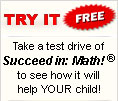How Can Kids with Dyscalculia be Effected?
Dyscalculia is a learning disability that effects many children, as well as adults. It is a learning disability with math. They tend to have problems understanding it, and grasping even simple concepts such as counting, or telling time.
Kids with Dyscalculia
 Dyscalculia can effect children in many ways, and this article will hopefully give you some insight as to why it is extremely important to treat dyscalculia as soon as you realize it’s apparent.
Dyscalculia can effect children in many ways, and this article will hopefully give you some insight as to why it is extremely important to treat dyscalculia as soon as you realize it’s apparent.
The list below is not in any particular order, and is only meant for you to think about.
1. For a child, being accepted by their peers is a very important part of growing up, and it has a huge effect on your child’s confidence as an adult. Having any type of learning disability is difficult to overcome, and many children feel inferior to other kids their age when they can’t do things as well as others.
2. Add to this, that children are mean. That statement is not meant to be taken out of context. I simply mean children have a learning curve as they grow up on how to behave socially. They say what’s on their mind, and they make judgement calls based on what they see and feel. It’s not until many years of experience and growing up do most children look beyond their world and see that the world itself is filled with different kinds of people.
Children with dyscaclulia may suffer from the ridicule and embarrassment of their classmates.
3. The domino effect. If a child feels inferior or inadequate in any thing in their lives, it’s very easy to give up on it. Once they give up on it, and possibly withdraw in other areas of their lives, it’s highly likely they will continue that path on through high school. Grades may slip, the child may give up on trying all together.
After high school (if they end up graduating) they may opt out of college, or they may start looking for a job. Without an education (high school at least), what kind of job do you think your child will end up with? On that same note, what kind of job doesn’t include math or numbers? Not many, and certainly not many high paying jobs.
Math is in everyday life, no matter what you do or where you go. We don’t have to be geniuses in the subject, but grasping the simple concepts are a must. We must be able to tell time, we must be able to know in what order the numbers go, and we must be able to understand addition/subtraction/multiplication/division.
If your child has dyscalculia (or you suspect they do), do not worry. There are ways for your child to overcome dyscalculia. There are books, and software your child can use that help them learn the math skills they need for everyday life. Ask your child’s teacher to give you updates on your child’s progress, and above all, support your child in their journey. (Take a quick test for a short assessment of your child.)
If you would like more information on a fun package that helps kids with dyscalculia, you can check it out here.
